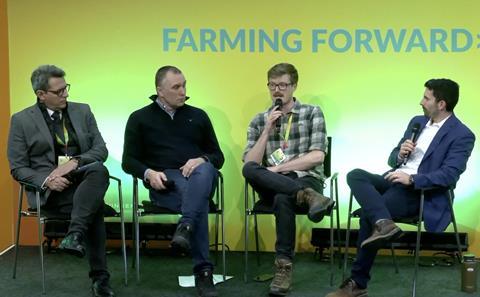A CEA Alliance workshop on the Farming Forward stage looked at what is a rapidly growing sector of the fresh produce industry and discussed sustainable improvements

The Controlled Environment Agriculture Alliance (CEA Alliance), a membership trade association representing and serving vertical farms and greenhouse producers growing fruits and vegetables in a highly controlled indoor production environment, hosted several workshops on the Farming Forward stage in Berlin.
This panel session studied emerging technologies, strategies for profitability and retail perspectives, covering the latest in controlled environment agriculture.
Moderated by Kyle Freedman of Jiffy, the panel included Jack Farmer, chief scientific officer at LettUS Grow; Joakim Rytterborn, chief technologist and co-founder of Swegreen; and Efthimios Livaditis, vice-president at Thrace Greenhouses.
At a basic level, what does sustainability mean to you and your company? How do you define it?
Jack Farmer: For me it falls into two areas. As an equipment supplier we represent one of the highest carbon things that a grower can install, because building a glasshouse and an irrigation system means a lot of metal and plastic and unfortunately they are never going to be net zero.
So firstly there is the embedded carbon in the facility that we have an impact on, the water and everything else that goes into its build, and then there is the embedded carbon in your produce, which is very much under the growers’ control but we can enable that to go down.
When we look at our impact on a Scope 1, 2 and 3 perspective, I’m aware that we are trying to effect those two things. Our products should reduce the carbon of the fresh produce by having better throughput or better efficiencies, but on the product side we’re trying to make it as less bad as possible in terms of material selection.
Joakim Rytterborn: For Swegreen sustainability is in our DNA. The core of our existence forces us to be as sustainable as possible at every point. When it comes to water use, energy use and the choice of material, we always try to push it as far as it goes.
We need to do this because we are mainly based in the Nordics and we are very environmentally concerned. Our customers, the supermarkets, try to benchmark us against others which happens to be very hard because we use different metrics. Sustainability is in our mind every hour and we keep dwelling on how we can be better.
Efthimios Livaditis: Like Joakim our clients are supermarkets, and 95 per cent of our products goes to them. It has been a huge advantage for us to be different in this case.
When I first saw the carbon footprint on a product, it was a sign for us that this should be our point of difference, and a huge advantage to see that value in our products.
When we first started that project in 2014, those terms were not so easy and it wasn’t easy for the Greek market as well. Now, those things come so easily.
How do you prioritise which elements of your business you are going to focus on when it comes to initiatives that increase sustainability? How do you make those choices for now and for the future?
JF: It starts with a life-cycle assessment, you need to know what you are looking at fundamentally for your product and what is going to make a difference.
For us, it’s electricity and material selection particularly on our ultrasonic atomisers. Those things are going to make the most difference and what differentiates us to a hydroponic system. So the ability to repair our ultrasonics is critical to our impact, and if we reduce the electricity going into our atomisers we’ll make money, our customers make money and the environment wins.
On the upside we do have the benefit of utilising less growing media and enabling growers to grow more with yes. Often these are contingent on a grower’s decision, so we tend to focus on what is totally in our control, which is the design-side variables on electricity and the ultrasonics.
JR: Life-cycle analysis is an eye-opener, it actually tells you what has an impact in your business. When we conducted our life-cycle analysis it illuminated everything from the parts that go into the mahcines all the way to the end product leaving the store.
Growing indoors you have to replace the sun with artificial lighting, so you have to replace the sun with artifical lighting, so electricty is a huge part of the sustainability issue.
It turns out that even if you use the best lights, what has the biggest impact is where you source the electricity from. The residual mix of your country can totally ruin the final CO2 business case of your product.
However, we are very compatible when it comes to growing outdoors as we have replaced the transport, so we keep working on this.
JF: That’s actually one of the things that limits the geographical placement of vertical farms.
Unless your produce has been airfreighted in as it is in many of the Nordics or perhaps in the Middle East, often the carbon equation doesn’t make sense for a vertical farm, but it definitely can do if you’re displacing that kind of produce.
The right energy mix and right existing import balance, and then it makes sense.
EL: For Thrace Greenhouses the priority is cultivation, and we are focused on minimising the impact of cultivation.
We are trying to minimise the energy used, and that is our main priority right now. Thermal hot water helps us on that point.
Also, we want to install new photovoltaic power stations. Right now we only cover 35 per cent of our energy needs with photovoltaic but we have a programme to install new stations to cover, if possible, 100 per cent of the energy.
We care about fertilisers, we care about substrates, we want to make everything counts so we can improve each year.



